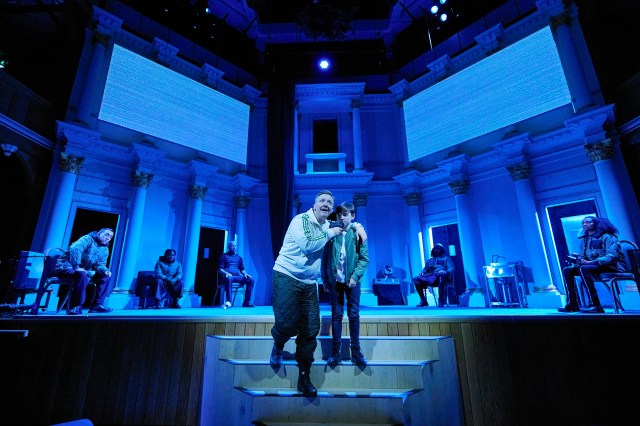ETT’s Macbeth at Shakespeare North Playhouse and on tour – review
The English Touring Theatre production is co-produced by Northern Stage, Shakespeare North Playhouse and Théâtres de la Ville de Luxembourg

“Art not without ambition,” Lady Macbeth reflects about her husband’s putative ideas on how to become King. The same could easily be said for this production of Shakespeare’s most potent study of psychological collapse. Mrs M’s quotation continues with a significant “but” – and the same is true here too.
Richard Twyman’s direction for his English Touring Theatre company, in co-production with Shakespeare North, Northern Stage and Théâtres de la Ville de Luxembourg, is full of ideas. Full, in fact, to overflowing. Plenty of them are interesting, some arresting, a few challenging. But in an odd way, they add up to something less than the sum of their parts – although it must be said that if Prescot’s audience reaction is typical of the forthcoming national and international tour, ETT’s nine-strong cast are in for a heady few months.
The Cockpit Theatre has been transformed for this show with the introduction of what is grandly being called a “frons scenae” – an end-on stage with scenery, to you and me. This cuts the seating capacity almost in half, taking up three sides of the Cockpit’s octagonal shape, and performances will require major reconfiguration for other tour venues. But here it enforces a close-up immediacy that is reflected in the intimacy of – spoiler alert – the Macbeths’ descent into madness and death.
Twyman and his academic consultant Emma Whipday have been unashamedly radical in their ripping up of Shakespeare’s structure. They begin with a new prologue highlighting the unfair treatment of Lancashire’s alleged witches over the centuries, then zoom straight in on Laura Elsworthy’s Lady M at home, breast-pump in hand, receiving a video message from her husband warning of King Duncan’s imminent arrival. Things seem to be set up for a bold interpretation of the text focusing on the story’s treatment of women.
But that is quickly dispensed with and the focus shifts to Macbeth himself, fresh from the glories of victorious battle. Except that any sense of nobility or warrior-like greatness is strangely absent from Mike Noble’s gabbling Scouse tyrant – along with the supernatural hags themselves, incidentally, until much later, when they finally appear as some kind of bewigged rejects from a Stephen King horror film.
Elsewhere, Lady M’s fierce urging on of her husband to the dreadful regicide is conducted, bizarrely, in an off-stage corridor, transmitted by CCTV onto two large screens, rendering any implication of audience complicity in the deed completely impossible. Much of the gimmickry has a similarly alienating effect: there’s nothing wrong with it per se, except when it gets in the way of the story rather than enhancing it – which is unfortunately far too often.
Ultimately, this version is all about the production, not the play. It looks terrific, thanks to Basia Bińkowska’s elegant design, and some of the ideas hit their mark – the first appearance of Banquo’s ghost, for example, is a superb use of technology which otherwise tends to the superfluous. But there’s little room for the language, which is often articulated cumbersomely, or even clarity of storytelling. It’s an impressive spectacle, with an abundance of flashy ideas. For me, it lacks the depth and visceral heft to strike an emotional chord.
















